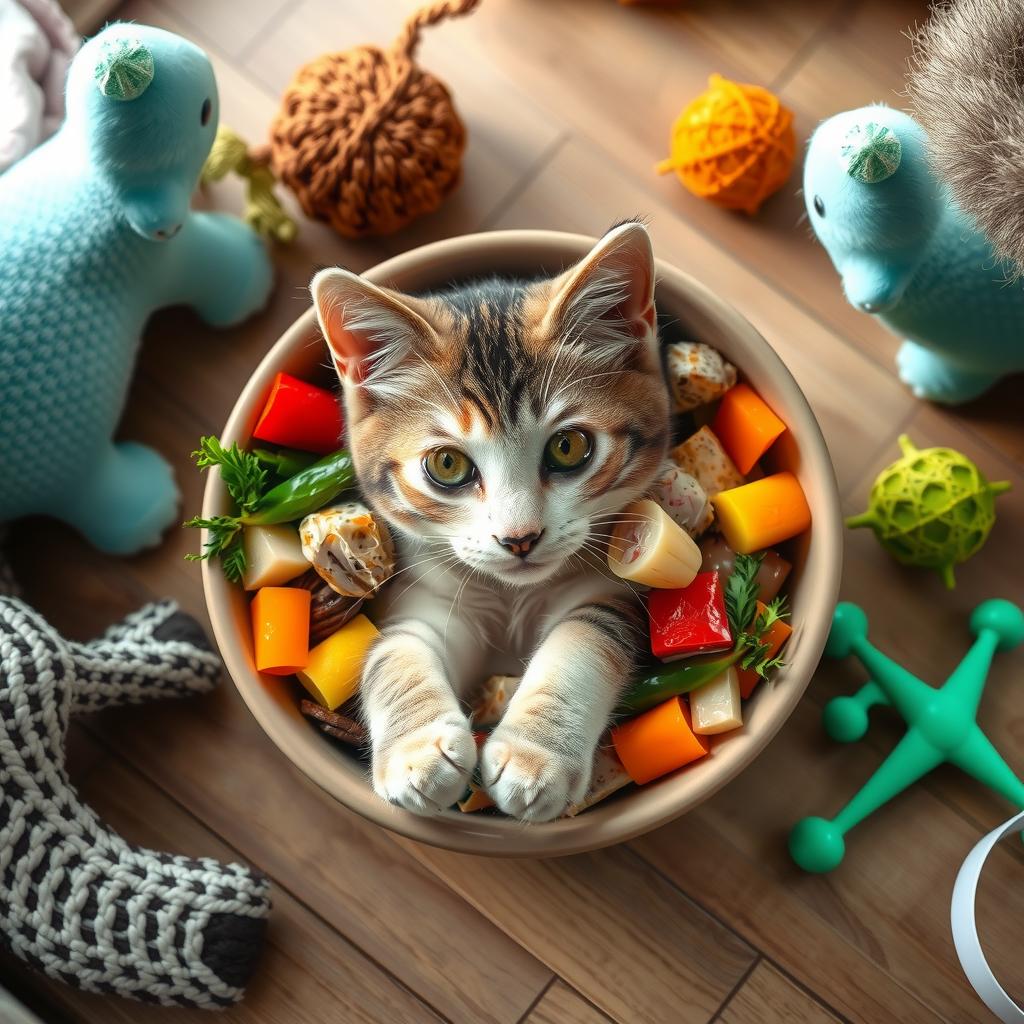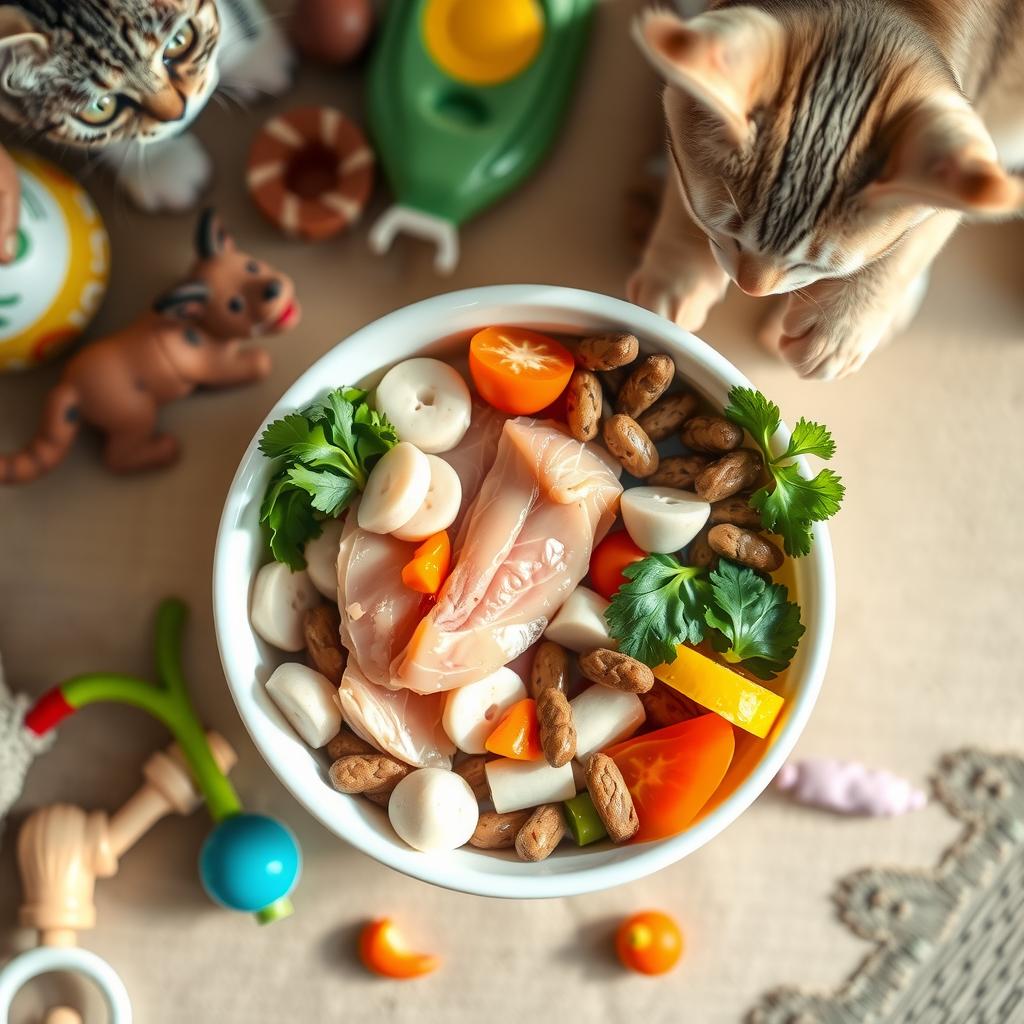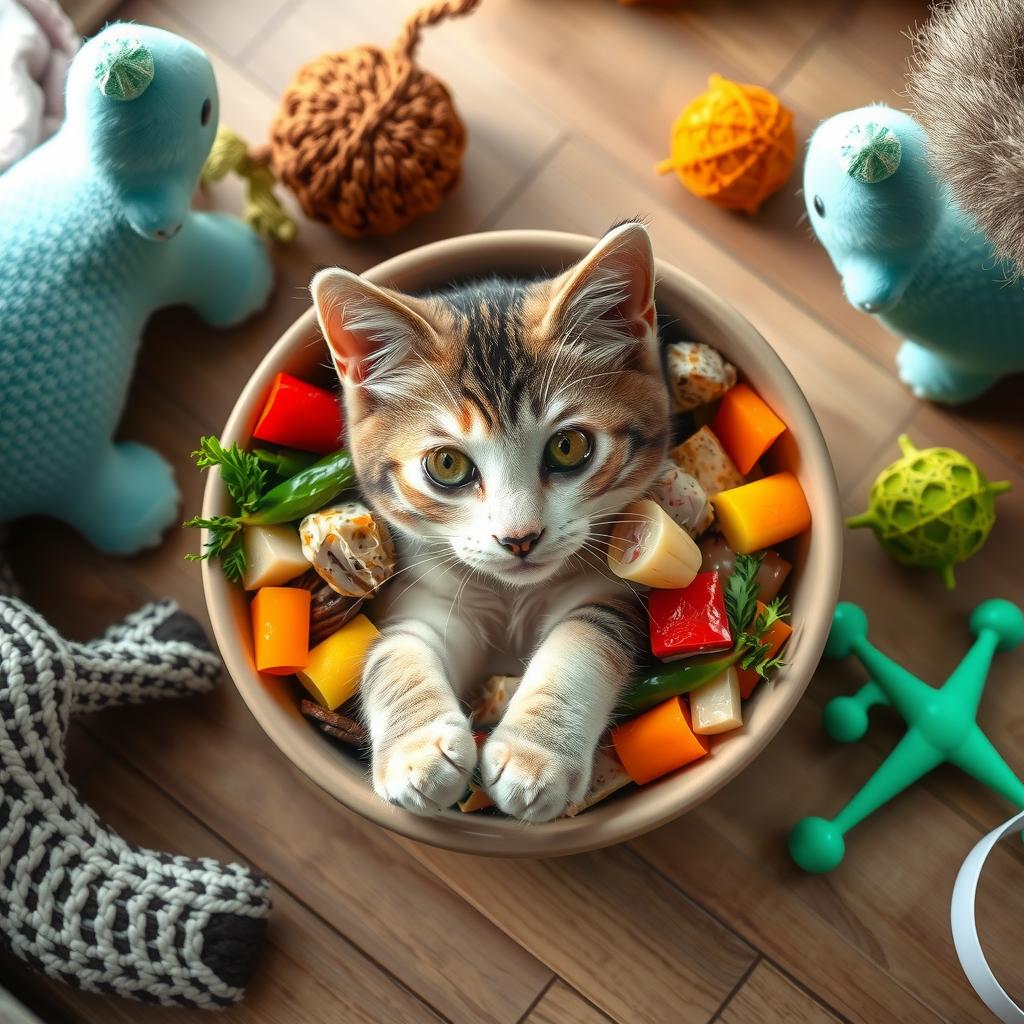When it comes to feline health, one of the most pressing concerns for cat owners is managing cat urinary issues. These problems can range from mild discomfort to severe complications that require immediate veterinary attention. As more pet parents become aware of the critical role diet plays in maintaining urinary health, they are increasingly seeking alternatives that specifically cater to their cats’ unique needs. One promising solution lies in adopting a grain-free diet, particularly through options like Grain-free wet food. This dietary choice not only supports overall well-being but also addresses specific challenges associated with urinary tract support.
With many conventional cat foods containing grains that can contribute to inflammation and other digestive issues, the shift towards a grain-free approach has gained momentum within the realm of feline nutrition. Such diets focus on high-quality proteins and low carbohydrates, thereby reducing the risk factors associated with common urinary problems in cats. The benefits of incorporating Grain-free wet food into a cat’s daily regimen extend beyond mere ingredient substitutions; they can significantly enhance hydration levels due to higher moisture content—an essential element for promoting healthy urine flow and preventing crystals or stones.
As pet owners navigate this landscape of dietary choices, understanding how specific ingredients impact their furry companions is crucial. A balanced approach using Grain-free wet food allows them to tailor a cat diet solution that promotes optimal bladder function while satisfying picky eaters who may be reluctant to consume dry kibble alone. By prioritizing animal-based proteins over fillers found in traditional grain-inclusive formulations, these wet foods provide vital nutrients necessary for supporting kidney function and overall vitality.
In this blog post, readers will delve deeper into why choosing Grain-free wet food could be pivotal for managing cat urinary issues effectively. Taking an informed stance on feline diets not only empowers pet parents but also fosters happier and healthier lives for their beloved cats—making it imperative for every owner facing such challenges to consider making this transformative switch today!

Key Points:
-
Dietary Impact on Urinary Health: Understanding the role of diet in feline health is crucial for cat owners. Many are unaware that specific dietary choices, especially involving grain-free wet food, can significantly influence their pets’ urinary health. By minimizing grains, these options help reduce the risk of crystal formation commonly associated with cat urinary issues.
-
Long-Term Wellness through Grain-Free Nutrition: Incorporating grain-free cat food not only addresses immediate health concerns but also supports long-term wellness. This specialized diet focuses on high-quality protein sources while eliminating grains, enhancing overall nutritional intake and ensuring that cats receive adequate hydration—essential for optimal urine production and urinary tract support.
-
Proactive Measures for Feline Care: As research highlights the importance of tailored nutrition in managing feline conditions, transitioning to nutrient-dense formulations like grain-free wet food becomes increasingly important. Such proactive measures address current ailments while preventing future urinary complications, ultimately contributing to a happier and healthier life for beloved companions dealing with potential cat diet solutions.

The Importance of Feline Nutrition in Urinary Health
Exploring Dietary Influences on Cat Urinary Issues
Understanding the relationship between a cat’s diet and its urinary health is crucial for pet owners. Cats are obligate carnivores, meaning their bodies are designed to thrive on animal-based proteins rather than grains. As more cat owners become aware of this fact, there is a rising interest in grain-free wet food options that cater specifically to feline dietary needs. A significant concern among veterinarians and pet owners alike revolves around urinary tract issues, which can be exacerbated by improper nutrition. Diets high in carbohydrates, particularly those loaded with grains, can lead to an increase in urinary crystals and stones due to the alteration of urine pH levels. When cats consume dry kibble containing grains instead of adequate moisture-rich food sources like grain-free wet food, they may not get enough hydration—a factor critical for maintaining healthy urinary function.
The Role of Hydration in Preventing Urinary Tract Problems
Understanding Moisture Needs for Optimal Feline Health
Hydration plays a pivotal role in supporting a cat’s urinary health; however, many commercial diets fail to address this need adequately. Cats naturally have low thirst drives since their ancestors obtained most fluids from prey animals. Therefore, feeding them primarily dry food can lead to chronic dehydration over time—an issue that significantly contributes to the development of cat urinary issues such as bladder stones or infections. Wet food options like grain-free wet food provide essential moisture content that helps dilute urine concentration and promote frequent urination—a natural way for cats to flush out toxins from their systems while preventing crystal formation. Moreover, incorporating these types of diets into daily feeding routines allows pet owners greater control over their cats’ hydration levels while ensuring they receive balanced nutrition tailored towards optimal well-being.
Choosing the Right Diet for Urinary Tract Support
Navigating Options for Improved Cat Diet Solutions
When considering dietary choices aimed at enhancing feline urinary health, it is essential first to evaluate ingredient quality within any chosen product line carefully. For instance, selecting high-quality protein sources alongside added nutrients known for promoting urinary tract support can make all the difference when addressing specific concerns surrounding your cat’s health conditions or predispositions toward certain ailments such as UTI or FLUTD (Feline Lower Urinary Tract Disease). Products featuring ingredients like cranberries or omega fatty acids not only help maintain healthy bladder function but also contribute positively towards overall feline nutrition standards desired by conscientious pet parents today—especially when paired with solutions such as grain-free wet food which inherently supports better hydration practices through higher water content compared with traditional kibbles.
Addressing Rising Concerns Over Cat Urine Health Issues
Analyzing Trends and Developing Effective Nutritional Strategies
As veterinary professionals report increasing cases related directly back down dietary habits influencing kitty wellness trends across various demographics—even within seemingly healthy populations—the importance placed upon choosing appropriate meals cannot be overstated anymore than now! It has become clear that inappropriate carbohydrate-heavy diets may cause long-term damage resulting from insufficient nutrient intake leading ultimately back down pathways toward chronic conditions linked directly against poor feline nutrition. By prioritizing modern advancements found within products emphasizing both holistic approaches alongside research-backed formulations—including staples like grain-free wet food—pet guardians stand better chances against rising concerns facing our beloved felines today regarding preventable situations surrounding lower-than-ideal outcomes faced during early stages signaled via signs indicating trouble ahead if left unaddressed entirely!
Grain-Free Wet Food: A Nutritional Solution
Exploring the Hydration Benefits for Feline Health
In recent years, pet owners have become increasingly aware of the significant impact that diet has on their cats’ overall health and wellbeing. One dietary choice that has gained substantial attention is grain-free wet food, which offers not only palatability but also a range of benefits crucial for maintaining optimal feline nutrition. Unlike traditional dry cat foods, grain-free wet food contains higher moisture content, an essential factor in promoting hydration among cats. This increased water intake can be particularly beneficial in preventing urinary complications—an issue many cat owners face with their pets. The combination of high protein and lower carbohydrate levels found in grain-free formulations aligns more closely with a cat’s natural dietary needs, thus supporting better digestion and nutrient absorption.
Moreover, urinary health is a top concern for many felines; conditions such as urinary tract infections or crystals can severely affect a cat’s quality of life. Feeding cats grain-free wet food helps to dilute urine concentrations by providing them with much-needed hydration through its moisture-rich composition. This dilution effect minimizes the risk of crystal formation and supports healthy kidney function over time. In addition to addressing immediate hydration needs, consistent use of grain-free options within your cat’s diet can foster long-term urinary tract support—making it an ideal solution for both prevention and management of common cat urinary issues.
The nutritional profile offered by grain-free wet food further enhances its appeal as part of a complete diet solution tailored to promote good health in felines. Many brands focus on high-quality ingredients without fillers like corn or wheat that provide little nutritional value yet contribute to weight gain or allergies in sensitive cats. With natural proteins sourced from chicken, turkey, or fish combined with nourishing vegetables like peas or carrots, this type of feeding regimen ensures that feline companions receive essential vitamins while enjoying flavorful meals they love.
Furthermore, transitioning from traditional dry kibble to wet food for cats might seem challenging at first; however, gradual incorporation into their meals often yields positive results without overwhelming your furry friend’s palate. By understanding the profound benefits associated with adopting a grain-free approach—including enhanced hydration levels and reduced risks related to urinary health—owners are better equipped to make informed decisions regarding their pet’s nutrition strategy.
In conclusion, selecting grain-free wet food represents more than just choosing another meal option; it signifies an investment into one’s beloved companion’s long-term wellness journey marked by improved hydration habits and healthier bodily functions across various systems including urinary tract integrity.
The Foundation of Feline Health
Tailored Nutrition as a Lifelong Commitment
When it comes to ensuring long-term wellness for cats, tailored nutrition plays an essential role that extends well beyond immediate relief. Cats are obligate carnivores, meaning their diets must be rich in animal-based proteins and low in carbohydrates. This is where grain-free wet food becomes particularly advantageous. Such diets not only align with a cat’s natural dietary needs but also promote optimal urinary health—a crucial aspect given the prevalence of cat urinary issues. By providing high-quality protein sources without excessive grains, pet owners can support their feline companions’ overall wellbeing while enhancing their quality of life.
Research has shown that many common health issues in cats can be mitigated through proper nutrition. For instance, urinary tract support is vital for preventing conditions such as bladder stones or infections that often plague felines. A diet enriched with moisture from grain-free wet food helps maintain hydration levels—critical for flushing out toxins and minimizing the likelihood of urinary complications. Additionally, the carefully selected ingredients found in these formulations contribute to balanced feline nutrition by delivering essential vitamins and minerals required for maintaining energy levels and promoting healthy skin and coat.
Quality Ingredients Matter
Understanding Nutritional Value
The quality of ingredients used in feline diets significantly impacts their overall health trajectory over time. Many commercial dry foods contain fillers like corn or wheat that do little to nourish a cat’s body effectively; conversely, grain-free wet food often boasts premium meat sources free from unnecessary additives. This focus on nutritional integrity aids not just in mitigating immediate discomfort but also fortifies long-term health outcomes by supporting critical bodily functions.
For example, incorporating high-protein options into a cat’s diet serves multiple purposes—from muscle maintenance to immune system support—which ultimately enhances vitality throughout various life stages. Furthermore, specialized formulas designed explicitly for addressing common ailments such as obesity or diabetes can lay down a strong foundation against future health challenges related to improper diet choices made early on.
Long-Term Dietary Solutions
The Role of Consistency
Consistency is key when establishing any dietary regimen aimed at fostering longevity among indoor cats who may have limited activity levels compared to outdoor counterparts. Gradually transitioning toward feeding routines centered around nutrient-rich selections like grain-free wet food ensures pets adapt comfortably while reaping maximum benefits over time—a process rather akin to nurturing plants: steady care leads them towards thriving environments.
Moreover, regular veterinary consultations allow caregivers insight into how specific formulations might alleviate emerging concerns while steering clear from trends favoring quick fixes devoid of lasting effectiveness; this preventative approach allows guardianship rooted firmly within informed decision-making processes regarding feline nutrition. As each month passes alongside mindful adjustments reflecting changes observed—the bond forged deepens amidst shared goals toward flourishing mutual existence between humans and their cherished companions.
Enhancing Quality of Life Through Diet
Fostering Holistic Wellbeing
In summary, prioritizing tailored nutritional strategies—especially through options like grain-free wet food—is integral not only for addressing current feline medical concerns but also paving pathways towards sustained wellness across lifetimes spent together with beloved pets! It invites proactive involvement grounded upon understanding individual requirements aligned exquisitely within wider contexts encompassing emotional enrichment alongside physical upkeep—all contributing harmoniously toward fulfilling lives steeped deeply beneath layers woven intricately involving trust built between animals & humans alike!
Frequently Asked Questions:
Q: How does diet affect my cat’s urinary health?
A: Diet plays a crucial role in maintaining urinary health for cats. Specifically, incorporating grain-free wet food into their meals can help reduce the risk of developing common cat urinary issues. This type of food not only provides optimal hydration but also minimizes the chances of crystal formation that often occurs with grain-laden diets.
Q: What are the advantages of choosing grain-free options for my cat?
A: Choosing grain-free cat food offers several benefits, particularly for those cats predisposed to urinary complications. By focusing on high-quality protein sources and eliminating grains, this specialized nutrition enhances overall feline wellness. Additionally, it ensures that even picky eaters find mealtime enjoyable while supporting urinary tract health through adequate moisture content found in wet foods.
Q: Can switching to grain-free wet food really prevent future urinary problems?
A: Yes, transitioning to grain-free wet food can significantly contribute to preventing future urinary issues in cats. As studies highlight tailored nutrition’s importance in managing feline conditions, feeding your pet nutrient-dense formulations serves as an effective cat diet solution. This proactive approach not only addresses existing ailments but also promotes long-term wellness by supporting healthy urine production and flushing out toxins from your cat’s system.

